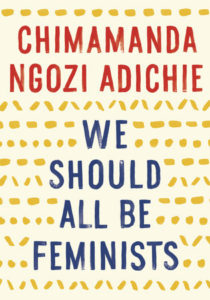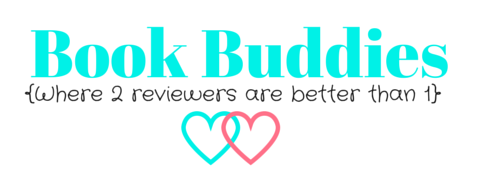 We Should All Be Feminists by Chimamanda Ngozi Adichie
We Should All Be Feminists by Chimamanda Ngozi Adichie Published by Vintage on July 29th 2014
Pages: 49 •Goodreads

An eBook short.
What does “feminism” mean today? That is the question at the heart of We Should All Be Feminists, a personal, eloquently-argued essay—adapted from her much-viewed TEDx talk of the same name—by Chimamanda Ngozi Adichie, the award-winning author of Americanah and Half of a Yellow Sun. With humor and levity, here Adichie offers readers a unique definition of feminism for the twenty-first century—one rooted in inclusion and awareness. She shines a light not only on blatant discrimination, but also the more insidious, institutional behaviors that marginalize women around the world, in order to help readers of all walks of life better understand the often masked realities of sexual politics. Throughout, she draws extensively on her own experiences—in the U.S., in her native Nigeria, and abroad—offering an artfully nuanced explanation of why the gender divide is harmful for women and men, alike. Argued in the same observant, witty and clever prose that has made Adichie a bestselling novelist, here is one remarkable author’s exploration of what it means to be a woman today—and an of-the-moment rallying cry for why we should all be feminists.
Book Buddies is a discussion style review I participate in every other month with my friend Lauren who runs the blog Bookmarklit. We choose a themed book for the month, read it, and the have a discussion where we both discuss themes and aspects that really stood out to us. Book Buddy Reviews are posted during the last week of the month.You can see our review in a Q&A format with half posted here, and half on Lauren’s blog!
This month Lauren and I chose a topic that has shaped and taught both of us: feminism. Instead of our usual selection of a novel, we decided to read an essay version of a noteable Ted Talk given by author Chimamanda Ngozi Adichie. You can check out the Ted Talk here.
2) Adichie talks about the importance of anger, and how it can be used in a positive way to enact change. However, she addresses the notion that anger (along with other strong emotions) is not seen as a suitable emotion in females, and can often be stifled and discouraged. What harmful effects do you think are byproducts of the notion of anger being seen as an “unattractive” personality trait for females?
L: This reminds me a lot of the whole bitchy/bossy vs. being a boss/powerful conversation. Often women, especially in positions of power, are viewed as bitches or too bossy when it comes to their work. For some reason, women are expected to react with their emotions over their intelligence. They’re considered bitchy when they have an opinion. On the flipside, there are plenty of women who kind of roll over and can be seen as too sensitive to handle anything. Women want to shrink up their personalities and be agreeable instead of standing up for what they believe in. There are quite a few examples from the text that Adichie shares about women in the workplace that are valuable reads. In general though…I feel like to be a feminist, you have to be a little angry! Angry at the world for being so imbalanced and unequal. If you’re not mad about the position women are in, it can be hard to make changes. I feel like I barely answered your question but maybe you have a more concise way of describing what I’m getting at 😉
C: The “bossy” phenomena is a great example! Another issue that stems from the stigma of women and anger that I think is a huge issue is rape culture. I think that the systematic societal disapproval of women emoting feelings such as anger, discontent, displeasure, etc. leads to more harmful situations where women may not feel comfortable voicing a lack of consent. Think about in any social situation how uncomfortable women often feel saying “No” or “Leave me alone,” whether its when a shady person starts talking to you on the subway or when an aggressive salesperson won’t leave you alone in a store. I consider myself someone very vocal and OK saying “No,” but even I sometimes feel uncomfortable when I have every right to say no, or get angry about something and remove myself from the situation. I think anger is a VERY important tool for anyone to harness for their own safety and well being at times, and stifling that and reiterating that it’s an unattractive trait to have is downright dangerous.
3) What do you think of the notion of “bottom power?” Do you think it’s subversive and manipulative, or innovative for a class of women in a dire state of oppression? Do you think Adichie’s negative view of it is indicative of a re framing of feminism in the modern era, or of a more privileged view of feminism?
4) What are examples you notice of the gap between male and female success, respect, and mobility? What internalized notions of gender roles were ingrained in you growing up that you’re now aware of? What gender roles were or are more fluid in your relationships or family?
L: I work at a recruiting firm that deals primarily with engineering and manufacturing companies. Most of the candidates we place in jobs are males because most engineer or high-level operations managers are male. Female success is interesting because so many people may say “oh she’s a great female engineer” as if it’s necessary to share the gender. She can’t just be a great engineer, period? It’s harder to move up because of how women are kind of “trained” within society. As we mentioned above, the idea of being bitchy and bossy happens only to women in positions of power; men are never accused of being bossy. In terms of family dynamics, the gender roles within my family were actually not as clear as most. My dad handles all of the cooking, most of the laundry, and the yardwork. My stepmom handles the cleaning. He handles a lot more traditional “women’s work” around the house than she does, and he’s always been that way. I’ve loved seeing that; it made me question gender roles from a young age without really realizing it. I could probably go on and on about traditional gender roles because they’re something I’ve done a lot of research on in the past! I think the biggest thing for me is that the “damsel in distress” trope bothers me much more than it used to, as well as the “bad boy needs to be saved by the good girl” thing. There are SO many romance tropes that bug me now that I have a clearer view of feminism.
C: I’ve always noticed the gap in gender roles the most when it came to high-level careers. For example, I noticed at a young age that primary school teachers were almost always female, but the higher up in school the more likely you were to get a male teacher, as more “professors” at my university were male than female. I’ve also noticed that many “female” domestic tasks become “male” careers once they reach a certain level (such as with cooking- Adichie uses cooking as an example of a task women are expected to be good at. Yet when it transitions from a role that serves to a role that is creative and/or a source of income, it becomes a male dominated profession. Hence there are many more male executive chefs than female). While there were some gender roles in my family that were more rigid (my mom always cooks and my dad never does, for example), there were also gender roles that were never reinforced. My parents always both had careers, and it was always expected that both my brother and I would go to college and have careers. I also feel that in my relationship now, the gender roles are pretty fluid. For example, I’m not hugely into cooking myself, but Max is a great cook and baker and often shows me how to navigate around the kitchen. I’d like to think that with our generation there is less adherence and importance placed on traditional gender roles, but in some ways I think that while they’ve become more fluid they haven’t necessarily become more equitable (for example, it’s much more common now for women to go to college and have careers, but they’re often still expected to be the primary caregiver and handler of domestic tasks, essentially doubling their workload.
5) Are there any points you disagree with Adichie on, or would like her to provide more evidence for in order to convince you?











Good point about the stats! Most of her examples were personal stories so it can be hard to think “okay looks like we ALL need feminism based on HER stories!” … It would be good to toss in some examples about how this is common for the vast majority of women.
Also like what you said about anger and rape culture – so true!
Thank you, Lauren! I so enjoyed exploring this topic with you, it’s so great to have someone to have these sort of discussions with! Makes me miss college 🙂
This is SO interesting. I was raised in a home that disliked liberalism and ‘radical’ feminism (there was no other kind of feminism) and my mom would read books and listen to radio shows that cried out against feminist teachers and caregivers harming boys by raising them like little girls. In my opinion? I’m not going to say that kind of thing has ever happened, but it seemed like a silly concept to me. Like all the great stuff about feminism and gender equality was being tamped down by the fear that little boys would be hurt. In my experience, some of the most amazing guys I’ve ever known have been raging feminists and raised to respect and appreciate women. In some cultures and belief systems, I guess those guys would be seen as lesser men. That just makes me… AUGH! But anyway, I’ve only just read your first few paragraphs and already I have this much to say!
I’m so glad you found our discussion engaging! I think that it’s sad that the label of feminism is such a deterrent to what I think can be a really natural sense of empathy in males, and society often squashes it out of them before they can really nurture that empathy. I know my boyfriend grew up in a household full of females (his mother and two older sisters) and while I don’t think he’d call himself a feminist in the activist sense, his ideals and behavior are so in line with the movement. I think today too there are so many more definitions of feminism and ways to be involved that it’s a lot more accessible than a few years or decades ago when it was either radical feminism or nothing. Thanks for stopping by!